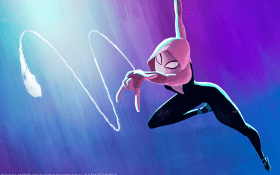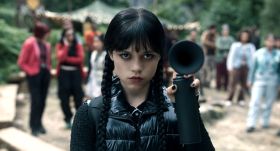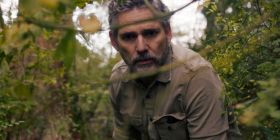A young girl from a revered and respected family spends her youth as an outsider. After tragedy strikes, the happiness of her early childhood fades, to be replaced by years of servitude and cruelty. Upon maturity, she is cast out from her home by her malicious and manipulative stepmother, yet her fortitude – and the kindness of diminutive helpers – sees this life-long victim transformed into a heroine.
From a young age, children are well-versed in Snow White; in the past year, Hollywood productions Mirror Mirror and Snow White and the Huntsman have further cemented its popularity within popular culture. Spanish incarnation Blancanieves may be the third film to retell the fairy tale within the space of 12 months, but its status as the latest in a long line of adaptations should not be dismissed. In a silent, black and white saga steeped in the bittersweet world of bullfighting, Pablo Berger’s version is like no other.
Carmencita (debutant Sofía Oria) is the daughter of toreador Antonio Villalta (Daniel Giménez Cacho, Get the Gringo) and singer Carmen de Triana (Inma Cuesta, Unit 7). The former is gored in the ring, the latter dies in childbirth, leaving the girl first with her grandmother (Ángela Molina, The Way) and then her father’s former nurse turned second wife (Maribel Verdú, Pan’s Labyrinth). As Carmencita blossoms into a beauty (Macarena García, TV’s Love in Difficult Times), animosity grows, with a henchman (Pere Ponce, The Great Vazquez) dispatched to bring about her end. Rescued by a band of dwarves travelling the bullfighting circuit, she is given a second chance.
Writer/director Berger’s second feature may be a vast departure from his first effort (comedy-drama Torremolinos 73), however its deviations from the Brothers Grimm’s famous creation are less pronounced. Although its setting is quite dissimilar to that of the original tale, the changes suit the story, re-investing a sense of magic and meaning into the fantastical fable. Small changes are evident, but don’t detract from the narrative; nor do they tarnish the original’s legacy. Instead, the film is swept up in the immaculate enchantment of the underlying melodrama.
Through Berger’s ambitious decision to render his Gothic-leaning reinterpretation without dialogue, in monochrome and within an Academy ratio, Blancanieves becomes more than just a revision of a classic; within its exceptionally filmed (by The Last Circus’ Kiko de la Rica) and exquisitely edited (by Don’t Be Afraid’s Fernando Franco) frames exists a perfect, poignant homage to European silent cinema. Every element of the meticulously-crafted ode soars with affection for its forebears, with the film a technical master class as well as an evocative and immersive throwback to the glory of the screen artistry of yesteryear.
Heightened by exaggeration and expressionism yet engaging in their theatricality, the performances are similarly magnetic, relishing the tale’s histrionics and the film’s lavish nature. Accompanied by a rhythmic flamenco score by Alfonso de Vilallonga (Transsiberian) that dictates the pace and intensity of the actors, Blancanieves is at all times bold, beautiful and breathtaking, offering the ideal example of turning a fairy tale into a film.
Rating: 4 ½ stars out of 5
Blancanieves
Director: Pablo Berger
Spain, 2012, 104 min
Screening as part of Perth Festival’s Lotterywest film program
www.perthfestival.com.au
25 November – 14 April
Actors:
Director:
Format:
Country:
Release:





